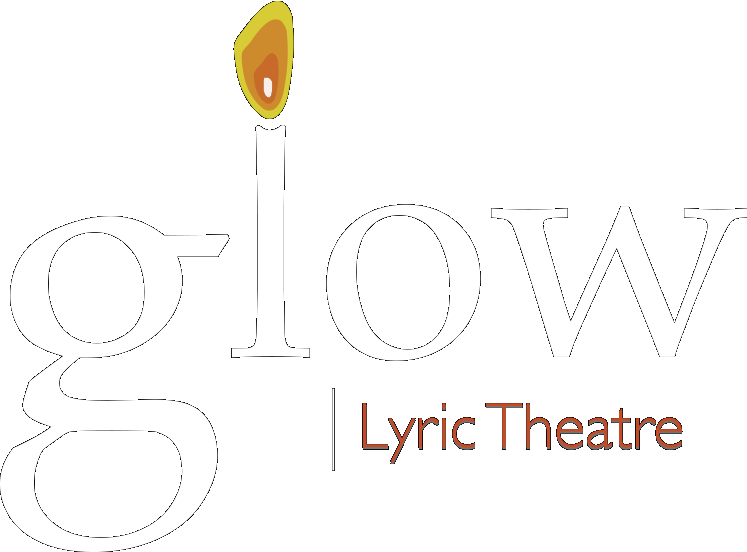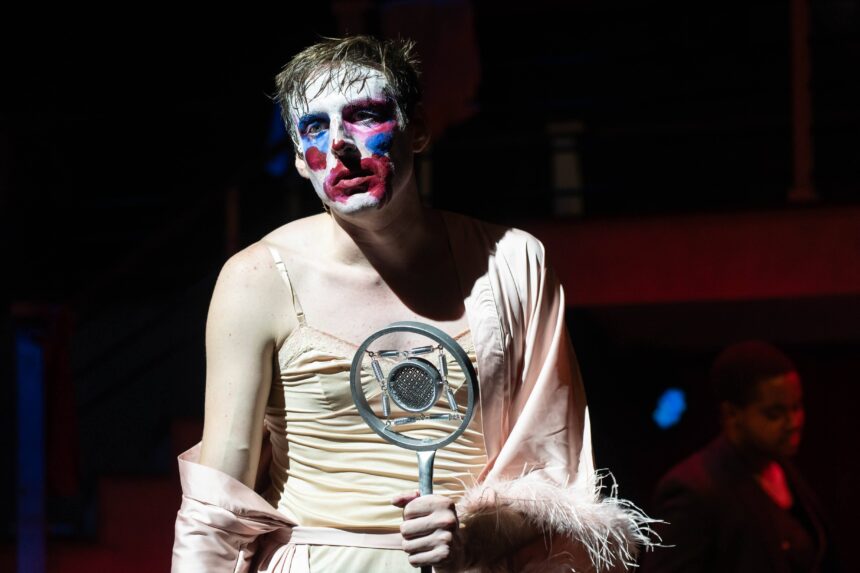Welcome to Glow Lyric Theatre’s Cabaret.
- 1998. 1972. Those are three major milestones of Cabaret, whose two musical versions became blockbusters, as did Bob Fosse’s later film adaptation.
After the musical’s Broadway revival, the movie forever stamped Liza Minelli and Joel Grey as the standard bearers of their respective characters. Yet, with its eight Oscars, the provocative menace of the original story perhaps eroded—and that brings us to 2023 and Glow Lyric Theatre’s production of the ’90s version.
A dramaturg can get deep into the weeds over the source material. In 1939, the British author Christopher Isherwood published Welcome to Berlin. The novel, which he insisted wasn’t autobiographical, recounts his experiences as a gay man in decadent, impoverished Weimer Germany from 1930 to 1932 during the rise of Nazism. In 1951, John Van Druten penned a play that would become the musical’s source: I Am Camera, a line taken from the first page of Isherwood’s book: “I am a camera with its shutter open, recording, quite passive, not thinking.”
Let’s now jump to Glow’s Cabaret, which commendably forces our camera lens to remain open, to make us think, to quit our passivity and to shudder at what societal hate can inflict on the “Other.”
Glow used Cabaret to open its 13th season, which also includes the Southeast premiere of an operatic version of “The Handmaid’s Tale” and “Black Broadway,” a musical revue of African American standards.
The theme is obvious: enslavement and fascism. We needn’t go into politics here, but rather consider Carrie Colton’s deft direction of Glow’s opening night in Greenville, South Carolina, on July 21.
Pacing is everything in this script, and Colton and her cast give the narrative and the two dozen or so numbers plenty of room to breathe and the actors to plumb their characters’ agonized depths.
The central character, Sally Bowles, is the flapper star of the Kit Kat Club, where bohemians of varying sexual orientations and degrees of hedonistic pleasure-seeking can feel safe from the creeping forces that lurk outside to destroy them.
Erin Grams plays Sally Bowles to remarkable effect, seemingly oblivious to Minelli’s shadow; after all, Grams graduated from St. Mary’s University in Minnesota in … get this … 2022. So she’s easily a quarter the age of Isherwood’s source material. Even weirder, in its delightful way, is that her Bowles bears an uncanny resemblance to Jean Ross, the cabaret-performer model of Isherwood’s book.
Grams shines. So does her chemistry with Seth Patterson, who plays Isherwood’s Americanized alter ego, Cliff Bradshaw, a struggling, bisexual novelist. Grams’ physical and emotional acrobatics and Patterson’s equally potent and nimble turn meld with particular tensile power, adding even richer depth to their characters’ internal and external agonies.
And never mind that both actors are physically attractive to the point of near-distraction—which is good, especially considering that Cliff frequently reminds Sally how much she distracts him from his writing in the run-down Berlin flat where they share a tiny bed.
Of course, the script’s most memorable face belongs to the unnamed Master of Ceremonies. Here, Tyler Pirrung plays the Kit Kat Club’s omnipresent emcee. In harlequin costume and off-the-chart sexuality, his effusive sexuality is neither binary nor ambiguous, but all over the map.
So is Pirrung’s performance. At first glance, his work feels a bit too much, too loud, even leading to a bit of distortion in the Kroc Center’s PA system. Perhaps he’s channeling Alan Cummings, whose 2014 portrayal led The Guardian to label Cummings’s emcee MC as “brutish, jackbooted” with “yobbish licentiousness.”
But Pirrung plays no brutish, jackbooted character-within-a-character. Rather, he leverages his near-over-the-top showiness through most of the show to intensify his character’s crushing despair at the end.
When Pirrung finally smears his clown makeup, he becomes a flesh-and-blood painting of what happens when we let hate and anger destroy us all—including those who generate all that rage. Likewise, when he appears with mussed hair and without his fingerpaint mask, he fills us with that much more profound sorrow and sympathy.
Cabaret may arguably be more relevant than ever before, but as a blockbuster, will its commercial shine make us forget that we damn well better pay closer attention? In Glow’s just-right handling, we’re left with the feeling that it’s damn past time to be complacent.


